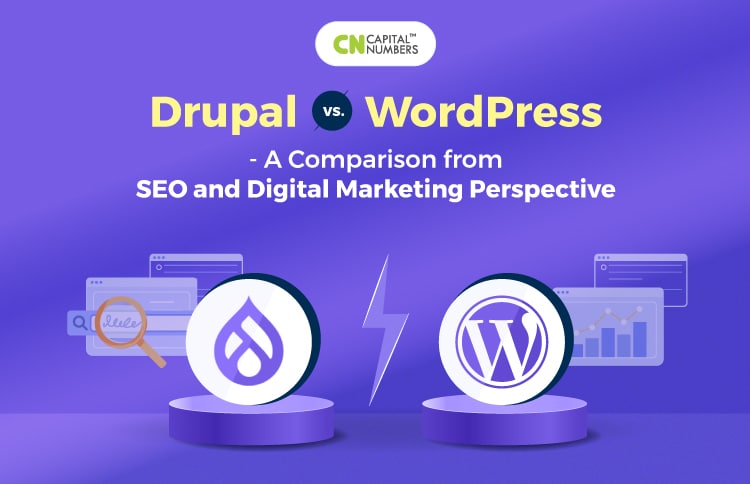Drupal vs. WordPress – A Comparison from SEO and Digital Marketing Perspective
Table of Contents
Choosing the right Content Management System (CMS) is crucial for website building and management. There are many options available in the market, but two of the most popular ones are Drupal and WordPress. Both have unique features that can impact your website’s Search Engine Optimization (SEO) and marketing efforts.
According to IBM, WordPress has created nearly 60% of all CMS-based websites, accounting for over 30% of all websites. By contrast, Drupal has been used for under 4% of all CMS-based websites, accounting for 2% of all websites.
But you should not consider only this statistic when choosing a CMS. Instead, consider your project needs, budget, and other vital things to decide on a CMS and choose whether to hire Drupal developers or WordPress developers.
A bit confused? Not be. Here, we will compare both CMSs based on their SEO and marketing features so that you can make a wise choice. Let’s read on.
Defining Drupal and WordPress
Drupal and WordPress are the most widely used Content Management Systems globally. You can use them to create and manage your website without extensive technical knowledge. However, they differ in their approach to website development. Drupal is more flexible and customizable, while WordPress is more user-friendly and accessible.
Drupal vs. WordPress: Comparisons of SEO Features
1. URL Structure
Drupal offers a clean and customizable URL structure, making it easier for search engines to understand the content on your website. Besides, with Drupal, you can create custom URLs and manage redirects, making it easier to maintain your site’s hierarchy and reduce the number of broken links.
Conversely, WordPress has a simpler URL structure that is less customizable than Drupal’s, but it is still functional and readable by search engines. However, it can be difficult to manage large-scale WordPress sites because of the need for advanced URL management tools.
2. Metadata Management
WordPress and Drupal can manage metadata, including page titles, descriptions, and keywords. However, Drupal offers more control over metadata management, making optimizing pages for search engines easier.
3. XML Sitemap Generation
Drupal provides automatic XML sitemap generation, making it easier for search engines to crawl your site and understand the structure of your content. WordPress provides XML sitemap generation through plugins, but it may require additional setup and configuration.
4. Content Optimization
Both Drupal and WordPress provide content optimization options, including adding meta descriptions and keywords and controlling the structure of your content through headings and subheadings. But Drupal provides advanced content optimization features, such as the ability to create custom content types and fields, making it easier to structure and optimize your content for search engines.
5. Responsiveness
Drupal and WordPress provide responsive design options, making creating a website optimized for mobile devices easier. But Drupal offers better customization options and the ability to create custom themes, making it easier to create a site optimized for search engines and providing a better user experience.
6. Social Integration
Drupal and WordPress provide social integration options, allowing you to share your content on social media and drive more traffic to your site. Drupal provides advanced social integration options, including the ability to add social media sharing buttons and to track social media engagement, making it easier to measure the success of your social media efforts.
7. SEO Friendly Themes
WordPress has a large number of search engine-friendly themes, which are designed to improve the search engine ranking of your website. On the other hand, Drupal has a limited number of search engine-friendly themes.
Drupal vs. WordPress: Comparisons of Marketing Features
1. E-Commerce Capabilities
WordPress has robust e-commerce capabilities, with many e-commerce plugins, such as WooCommerce, allowing businesses to sell products or services online easily. On the other hand, Drupal has limited e-commerce capabilities, making it less suitable for companies looking to sell products or services online.
2. Email Marketing
WordPress has many email marketing plugins, such as Mailchimp, that make it easy to send newsletters and promotional emails to customers. On the other hand, Drupal has limited email marketing capabilities, making it less suitable for businesses looking to use email marketing as a part of their marketing strategy.
3. Content Marketing
WordPress and Drupal have robust content management systems that make creating and publishing content easy. However, WordPress has a more straightforward content organization system, making it easier for businesses to create and manage website content. On the other hand, Drupal offers more control over URL structure and metadata management, making it better for businesses that need more control over their content.
4. Analytics and Tracking
Drupal has limited analytics and tracking capabilities, making it less suitable for businesses looking to track website traffic and measure the success of marketing campaigns. WordPress, on the other hand, has many analytics and tracking plugins, making it easier to track website traffic, measure the success of marketing campaigns, and make data-driven decisions.
5. Lead Generation
Both CMSs provide lead generation features, such as creating forms, collecting data, and managing lead information. However, Drupal provides better lead generation options, including custom forms, segment leads, and automated lead nurturing processes, making it easier to scale your marketing efforts.
6. Landing Pages
Drupal and WordPress provide landing page creation options, allowing you to create custom pages to support your marketing campaigns. But with Drupal, you can get advanced landing page creation options, such as creating custom page templates, segmenting your audience, tracking landing page performance, etc.
Also Read: Top 7 WordPress Myths Debunked
Bottom Line
Choosing a suitable CMS depends on the level of complexity you want in your website. WordPress’s simple and easy-to-use interface will serve you better if you’re looking for a website to support a blog or a small business. On the other hand, Drupal is ideal for complex, highly customized sites requiring scalability and large amounts of content to be organized.
But irrespective of your choice, you need to look for a development partner to hire dedicated WordPress developers or Drupal developers. Capital Numbers is a renowned digital engineering service provider offering various development services with expert developers. To discuss your project, book a call today!















